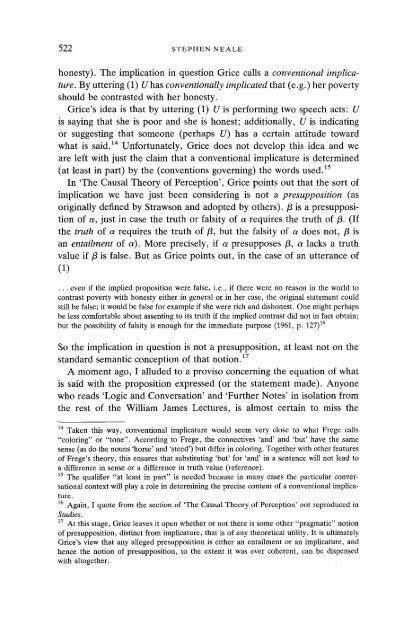Paul Grice and the philosophy of language
Paul Grice and the philosophy of language
Paul Grice and the philosophy of language
You also want an ePaper? Increase the reach of your titles
YUMPU automatically turns print PDFs into web optimized ePapers that Google loves.
522 STEPHEN NEALE<br />
honesty). The implication in question <strong>Grice</strong> calls a conventional implicature.<br />
By uttering (1) U has conventionally implicated that (e.g.) her poverty<br />
should be contrasted with her honesty.<br />
<strong>Grice</strong>'s idea is that by uttering (1) U is performing two speech acts: U<br />
is saying that she is poor <strong>and</strong> she is honest; additionally, U is indicating<br />
or suggesting that someone (perhaps U) has a certain attitude toward<br />
what is said. 14 Unfortunately, <strong>Grice</strong> does not develop this idea <strong>and</strong> we<br />
are left with just <strong>the</strong> claim that a conventional implicature is determined<br />
(at least in part) by <strong>the</strong> (conventions governing) <strong>the</strong> words used. 15<br />
In 'The Causal Theory <strong>of</strong> Perception', <strong>Grice</strong> points out that <strong>the</strong> sort <strong>of</strong><br />
implication we have just been considering is not a presupposition (as<br />
originally defined by Strawson <strong>and</strong> adopted by o<strong>the</strong>rs)./3 is a presupposition<br />
<strong>of</strong> a, just in case <strong>the</strong> truth or falsity <strong>of</strong> a requires <strong>the</strong> truth <strong>of</strong>/3. (If<br />
<strong>the</strong> truth <strong>of</strong> a requires <strong>the</strong> truth <strong>of</strong>/3, but <strong>the</strong> falsity <strong>of</strong> a does not, /3 is<br />
an entailment <strong>of</strong> a). More precisely, if a presupposes /3, a lacks a truth<br />
value if 13 is false. But as <strong>Grice</strong> points out, in <strong>the</strong> case <strong>of</strong> an utterance <strong>of</strong><br />
(1)<br />
•.. even if <strong>the</strong> implied proposition were false, i.e., if <strong>the</strong>re were no reason in <strong>the</strong> world to<br />
contrast poverty with honesty ei<strong>the</strong>r in general or in her case, <strong>the</strong> original statement could<br />
still be false; it would be false for example if she were rich <strong>and</strong> dishonest. One might perhaps<br />
be less comfortable about assenting to its truth if <strong>the</strong> implied contrast did not in fact obtain;<br />
but <strong>the</strong> possibility <strong>of</strong> falsity is enough for <strong>the</strong> immediate purpose (1961, p. 127) 16<br />
So <strong>the</strong> implication in question is not a presupposition, at least not on <strong>the</strong><br />
st<strong>and</strong>ard semantic conception <strong>of</strong> that notion. 17<br />
A moment ago, I alluded to a proviso concerning <strong>the</strong> equation <strong>of</strong> what<br />
is said with <strong>the</strong> proposition expressed (or <strong>the</strong> statement made). Anyone<br />
who reads 'Logic <strong>and</strong> Conversation' <strong>and</strong> 'Fur<strong>the</strong>r Notes' in isolation from<br />
<strong>the</strong> rest <strong>of</strong> <strong>the</strong> William James Lectures, is almost certain to miss <strong>the</strong><br />
14 Taken this way, conventional implicature would seem very close to what Frege calls<br />
"coloring" or "tone". According to Frege, <strong>the</strong> connectives '<strong>and</strong>' <strong>and</strong> 'but' have <strong>the</strong> same<br />
sense (as do <strong>the</strong> nouns 'horse' <strong>and</strong> 'steed') but differ in coloring. Toge<strong>the</strong>r with o<strong>the</strong>r features<br />
<strong>of</strong> Frege's <strong>the</strong>ory, this ensures that substituting 'but' for '<strong>and</strong>' in a sentence will not lead to<br />
a difference in sense or a difference in truth value (reference).<br />
15 The qualifier "at least in part" is needed because in many cases <strong>the</strong> particular conversational<br />
context will play a role in determining <strong>the</strong> precise content <strong>of</strong> a conventional implicature.<br />
16 Again, I quote from <strong>the</strong> section <strong>of</strong> 'The Causal Theory <strong>of</strong> Perception' not reproduced in<br />
Studies.<br />
27 At this stage, <strong>Grice</strong> leaves it open whe<strong>the</strong>r or not <strong>the</strong>re is some o<strong>the</strong>r "pragmatic" notion<br />
<strong>of</strong> presupposition, distinct from implicature, that is <strong>of</strong> any <strong>the</strong>oretical utility• It is ultimately<br />
<strong>Grice</strong>'s view that any alleged presupposition is ei<strong>the</strong>r an entailment or an implicature, <strong>and</strong><br />
hence <strong>the</strong> notion <strong>of</strong> presupposition, to <strong>the</strong> extent it was ever coherent, can be dispensed<br />
with altoge<strong>the</strong>r.














